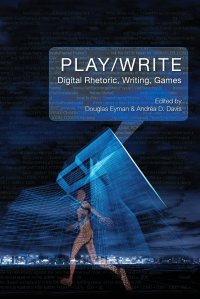ELECTRACY AND TRANSMEDIA STUDIES, Edited by Jan Rune Holmevik and Cynthia Haynes PLAY/WRITE: DIGITAL RHETORIC, WRITING, GAMES presents a wide range of approaches to digital video games as sites of composition and rhetorical performance. The chapters in PLAY/WRITE examine writing-both textual and multimodal-and rhetorical activity that takes place within games as player-game and player-player interactions, as well as external sites of writing, such as player communities, corporate-supported transmedia storytelling, walkthroughs, cheats, and documentation. The final sections of PLAY/WRITE consider the writing of games and the use of games as platforms for rhetorical actions. Following a new materialist approach, the key concept that all of these approaches build upon is that games operate in rhetorical ecologies that include designers, players, texts, communities, and the procedures of the gameplay mechanics and the operations of the games themselves. Contributors include Eric Alexander, Phill Alexander, James J. Brown, Jr., Kym Buchanan, Richard Colby, Rebekah Shultz Colby, Sean Conrey, Andréa D. Davis, Jessica Masri Eberhard, Douglas Eyman, Grace Hagood, Steven Holmes, Brian Ladd, Jill Morris, Scott Nelson, Joshua Peery, David M. Sheridan, Lee Sherlock, Wendi Sierra, Brandes Stoddard, and Emily Stuemke. "Despite what some players, creators, and critics may think or even hope, games do not exist in a cloister, separated from the rest of the media ecosystem. PLAY/WRITE: DIGITAL RHETORIC, WRITING, GAMES presents a welcome connection between games and rhetoric, through the lens of different types of writing. The result shows how we think to talk about games is as important as how we play them." -IAN BOGOST "Playing with words and semiotics within rule systems to defined and purposeful ends has always been the domain of rhetoric and composition. Combine verbal play with digital play and you have the important contribution that Eyman and Davis present in PLAY/WRITE: DIGITAL RHETORIC, WRITING, GAMES. Gaming asks audiences to take up an active subjectivity as an audience, co-creating the unfolding of texts. These activities, then, provide audiences an excellent transition from consumers to producers, players to makers. And this is the strength of this collection. Eyman and Davis have brought together a dynamic group of scholars who prove that the skills of analysis and production in rhetoric and composition can add new insight into game studies, and likewise, the act of writing about games, writing for games, and composing in the multimedia spaces afforded by games can highlight agency, theory, and ethics in game studies writ large. A must have book for anyone considering computer games in the classroom." -JENNIFER deWINTER Это и многое другое вы найдете в книге Play/Write. Digital Rhetoric, Writing, Games (Douglas Eyman, Andrea D Davis)
Play/Write. Digital Rhetoric, Writing, Games Douglas Eyman, Andrea D Davis
Подробная информация о книге «Play/Write. Digital Rhetoric, Writing, Games Douglas Eyman, Andrea D Davis». Сайт не предоставляет возможности читать онлайн или скачать бесплатно книгу «Play/Write. Digital Rhetoric, Writing, Games Douglas Eyman, Andrea D Davis»
